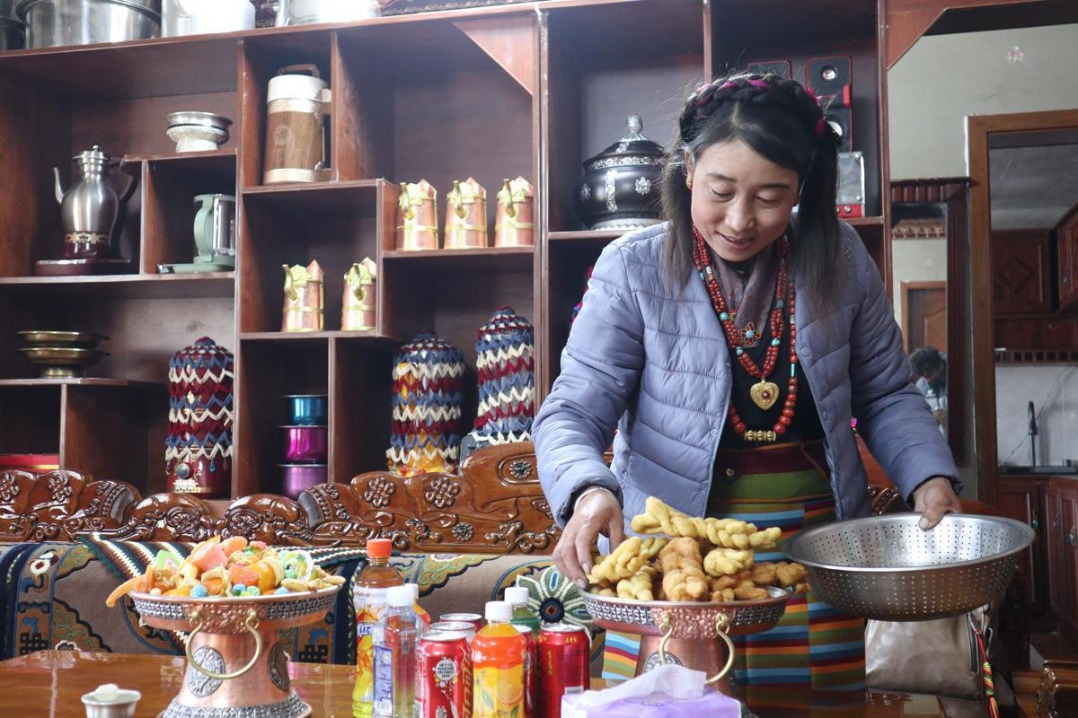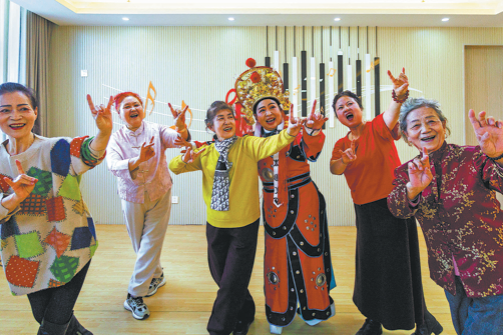Soul mates, sisters and soldiers

| Female students at Whampoa Military Academy in Wuhan, Hubei province, in 1927. Provided to China Daily |
The first female students to enroll in China's first modern military academy not only fought for women's rights, but also helped defeat Japan in World War II
Huang Jingwen lay on a hospital bed clinging to life. At 108 years old, there were few clues that she had fought fiercely for the freedom of her country.
"My mother entered Whampoa in 1927 as one of its earliest female students," says Luo Xiaoqing, Huang's daughter, referring to the military academy founded in Guangzhou in 1924 by revolutionary Sun Yat-sen. "As the country's first modern military school, Whampoa quickly became a source of hope for a strong and unified China, and an emblem for those women who saw their own struggle for independence as an essential part of the country's transformation from a feudal empire to a democratic republic."
Entering Whampoa sometimes meant breaking with their families. "The school's decision to recruit female students at its branch in Wuhan in early 1927 provoked a huge outcry from the more conventional sections of society," says Chen Yu, author of several books on the academy. In 1927, 183 women were accepted. Others followed during China's war with fascist Japan from 1937 to 1945, a total of about 800.
"The training routines at Whampoa were grueling," Chen says. A few of them had undergone foot-binding, a cruel process to which young Chinese girls had been subjected for centuries, giving them a pair of 'dainty' feet at the cost of broken bones. For them, the drill was doubly painful."

War was harder. Chen Baochen entered Whampoa in 1941. The only thing she wrote from the front was her will, penned before a fierce battle against the Japanese in July 1943. Chen was shot in the arm but lived. "She had seen too many deaths to lament her own," says Su Shaolong, a volunteer who records war veterans' memories.
"Even at age 89, she can still recall with great accuracy the scene that confronted her when she first entered a secret Japanese bunker after the Chinese victory. There, on the blood-soaked ground, were more than 60 'pairs' of dead Chinese and Japanese soldiers."
Some female alumni became martyrs, such as Zhao Yiman, Huang's classmate, captured, tortured and executed by the Japanese army when she was 31 in 1936. Zhao's last letter to her only son struck a chord with many Chinese.
According to amateur historian Wang Yi, many of the women worked as nurses. "All field hospitals were severely understaffed, and the soldiers who had had their limbs blasted away often died in agony. Doctors and nurses were quite literally enveloped by a sea of endless groaning and imminent death."
The chaos of the era makes Hu Lanqi's story exceptional. An early Whampoa graduate, Hu was a bold beauty and a Communist who was made a major general by the Nationalists in the early 1940s. Hu was a lover, and many think the lifelong love of Chen Yi, one of the 10 marshals of the People's Republic.
"But the true legend of the Whampoa women goes far deeper than that, in their unyielding spirit which lived on, probably more vigorously, in the latter half of their lives," says Chen Yu, the historian.
Most Whampoa women in the 1930s and 1940s had fought under the Nationalist flag. When World War II ended, the civil war began, ending in the founding of the People's Republic of China in 1949. "For the next three decades, those who had been affiliated with the Nationalist Party were put through a really hard time," Chen Yu says.
Wang has kept in touch with Whampoa graduates Zhou Yuyun and Zheng Miao, both nurses.
After Japan's surrender, Zheng returned to rural Hunan province with her husband, a military surgeon. He died during the "cultural revolution" (1966-76), not as a hero but as a "historic anti-revolutionary", a name for those who fought under the Nationalist flag. With two children to support, Zheng worked as a nanny and maid until the 1980s.
She can barely see or hear, Wang says. "But every time she knows someone has come for her, she holds the visitor's hand and feels it with her own again and again, gently, softly. It's a habit formed over the long years of babysitting. She always makes you feel loved, in her heartbreaking, maternal way."
Zhou, 95, had four children, but had to give her first and third, both boys, to her older sister before joining the troops. She now lives in Jiangsu province with her daughter and second son. In April, Zhou returned to her Hunan hometown for the first time in 70 years. Her sister had died, but one of the boys Zhou entrusted to her was there, aged 75.
"The other boy drowned in childhood, and Zhou only learned about it years later, after 1949," Wang says. "She told me she felt guilty about all her children. Because of her former association with the Nationalists, her only daughter was denied the opportunity of entering university in the 1970s."
The meeting was sad. "The son has cerebral thrombosis and was brought to our hotel room in a wheelchair. While he spoke in a slur, Zhou just wept. We all did."
But there was one other person Zhou insisted on seeing - Zheng. Both entered Whampoa in 1939. "The meeting was a crucial moment, delayed by well over half a century," Wang says. "Days before, Zheng had just celebrated her 100th birthday. And because she can't see, the two just held hands for a long time. And I guess that soothed a lot of the pain for both of them."
For Luo, Huang's daughter, what the women shared is far more important than their differences. "Some became famous while others settled for anonymity; some reaped love while others waited for it their whole lives. But all of them answered the call when the country was in need."
Yang Yang and Zhang Yuchen contributed to this story.
zhaoxu@chinadaily.com.cn
(China Daily Africa Weekly 06/27/2014 page26)
Today's Top News
- US quits 66 intl organizations under Trump's order
- Handcrafted gold market gaining increased luster
- Demonstration held in Venezuelan capital, demands release of Maduro by US
- Time for US to stop violating UN charter
- China, Africa share harvest of strong ties
- US conducting operation to seize Venezuela-linked oil tanker in Atlantic: US media































